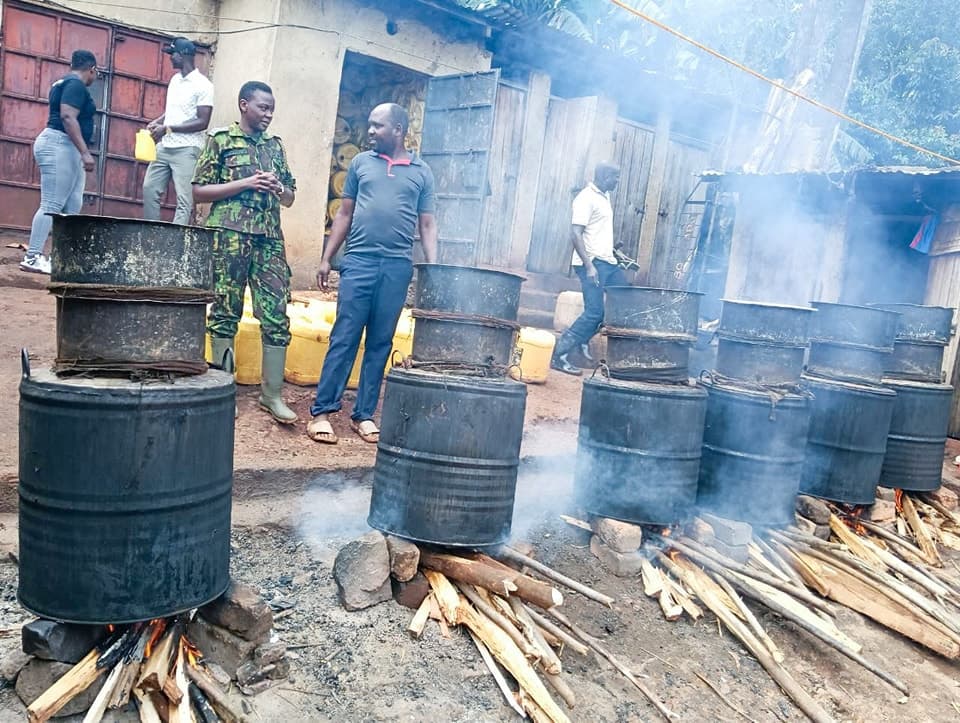We're loading the full news article for you. This includes the article content, images, author information, and related articles.
A multi-agency operation in Kisii County highlights the persistent national struggle against unregulated alcohol, a trade linked to severe public health crises and economic disruption across Kenya.

A multi-agency security team on Tuesday, October 28, 2025, seized and destroyed over 400 litres of illicit brew, locally known as 'kangara', in a targeted crackdown in Kisii County. The operation, conducted by officers from the National Police Service (NPS) and National Government Administration Officers (NGAO), took place in Nyamanani Village, Eburi Sub-location, where the brew was discovered hidden within a sugarcane plantation.
In a statement released on Tuesday, the National Police Service confirmed the details of the raid, stating that the primary suspect fled the scene and is currently being pursued by law enforcement. "The National Police Service (NPS) reiterates its commitment to sustaining the crackdown on illicit brews and other illegal activities that endanger public health and safety," the statement read in part, underscoring the government's ongoing efforts to combat the menace.
The raid in Kisii is a microcosm of a much larger, deeply entrenched issue facing Kenya. The production and consumption of illicit alcohol is a nationwide crisis with devastating consequences. According to a May 2024 report by Euromonitor, an estimated 60 percent of all alcohol consumed in Kenya is illicit and unregulated. This thriving underground market is fueled by high taxes on legal alcohol, the low cost of illegal brews, and inconsistent enforcement of existing laws.
These unregulated concoctions often contain hazardous substances, including methanol, an industrial chemical that can cause blindness, organ failure, and death even in small quantities. The UK's Foreign, Commonwealth, and Development Office recently issued a travel advisory for Kenya, warning its citizens about the risks of methanol poisoning from tainted alcohol. The human cost is staggering, with numerous reported fatalities and severe health complications linked directly to the consumption of these dangerous brews.
In response to the escalating crisis, the Kenyan government has intensified its crackdown through a multi-agency approach. This involves coordinated efforts between the NPS, NGAO, and the National Authority for the Campaign Against Alcohol and Drug Abuse (NACADA). These operations are part of a broader Rapid Results Initiative (RRI) aimed at eliminating the production, sale, and consumption of illicit alcohol.
Recent weeks have seen similar large-scale operations across the country. In Muhoroni, Kisumu County, a security team destroyed over 3,000 litres of kangara on October 26, 2025. In May 2025, a NACADA-led operation in Narok County destroyed over 5,000 litres of the same brew. These crackdowns often involve dismantling makeshift distilleries and confiscating brewing apparatus.
The government's strategy also includes legislative and administrative measures. In March 2024, the government announced 25 stringent directives to curb illicit brews and substance abuse. These included a directive prohibiting public officers from owning or operating bars to avoid conflicts of interest. Interior Cabinet Secretary Kipchumba Murkomen has repeatedly warned that security officers found colluding with illicit brewers will face disciplinary action.
The proliferation of illicit brews has profound socio-economic consequences. It is linked to increased crime rates, domestic violence, and a decline in productivity as addicts are often unable to maintain employment. The trade robs the country of significant tax revenue and undermines legitimate businesses in the alcohol industry.
Health facilities are often burdened with treating complications arising from toxic alcohol consumption. Furthermore, studies have shown that brew dens can facilitate other risky behaviors, contributing to the spread of diseases like HIV. Community leaders and residents in affected areas have largely welcomed the government's intensified efforts, citing the destruction these brews have caused to families and the youth.
Officials continue to emphasize the importance of public cooperation in this fight. The government has established a toll-free number (1192) for citizens to report any activity related to the production and sale of illicit alcohol. As the National Police Service stated, "Members of the public are encouraged to continue sharing timely information to aid in the fight against crime." The success of eradicating this threat, authorities maintain, depends on a sustained, collaborative effort between law enforcement and the communities they serve.
Keep the conversation in one place—threads here stay linked to the story and in the forums.
Other hot threads
E-sports and Gaming Community in Kenya
Active 8 months ago
The Role of Technology in Modern Agriculture (AgriTech)
Active 8 months ago
Popular Recreational Activities Across Counties
Active 8 months ago
Investing in Youth Sports Development Programs
Active 8 months ago
Key figures and persons of interest featured in this article